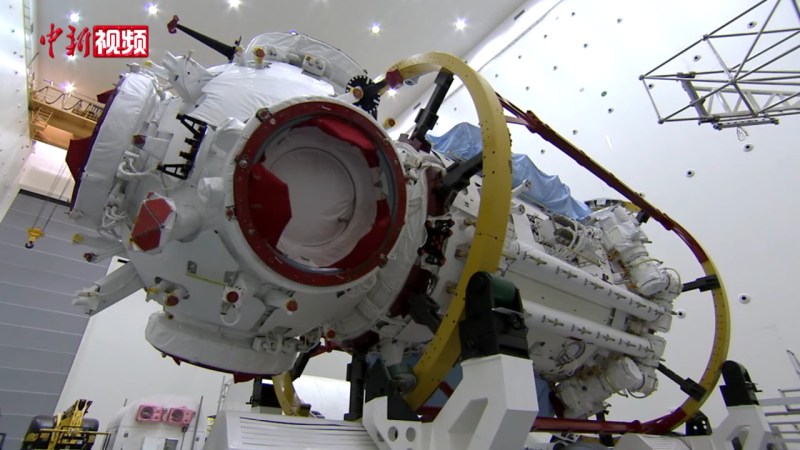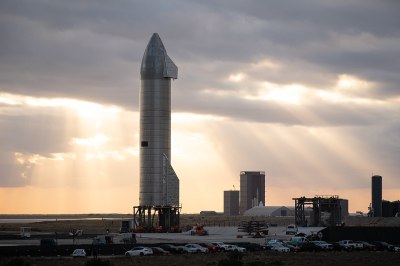If you were born in the 1960s or early 1970s, the chances are that somewhere in your childhood ambitions lay a desire to be an astronaut or cosmonaut. Once Yuri Gagarin had circled the Earth and Neil Armstrong had walked upon the Moon, millions of kids imagined that they too would one day climb into a space capsule and join that elite band of intrepid explorers. Anything seems possible when you are a five-year-old, but of course the reality remains that only the very fewest of us ever made it to space.
Did You Once Dream Of The Stars?

The picture may be a little different for the youth of a few decades later though, did kids in the ’90s dream of the stars? Probably not. So what changed as Shuttle and Mir crews were passing overhead?
The answer is that the Space Race between the USA and Soviet Union which had dominated extra-terrestrial exploration from the 1950s to the ’70s had by then cooled down, and impressive though the building of the International Space Station was, it lacked the ability to electrify the public in the way that Sputnik, Vostok, or Apollo had. It was immensely cool to people like us, but the general public were distracted by other things and their political leaders were no longer ready to approve money-no-object budgets. We’d done space, and aside from the occasional bright spot in the form of space telescopes or rovers trundling across Mars, that was it. The hit TV comedy series The Big Bang Theory even had a storyline that found comedy in one of its characters serving on a mission to the ISS and being completely ignored on his return.
A few years ago a Chinese friend at my then-hackerspace was genuinely surprised that I knew the name of Yang Liwei, the Shenzhou 5 astronaut and the first person launched by his country into space. He’s a national hero in China but not so much on the rainy edge of Europe, where the Chinese space programme for all its progress at the time about a decade after Yang’s mission had yet to make a splash beyond a few space watchers and enthusiasts in hackerspaces. But this might be beginning to change.
Everybody’s Launching Rockets, It Seems

As we approach two decades since Shenzhou 5, it seems as though the Chinese space program has rarely been away from the news. On the Moon last year the latest in their ongoing Chang’e series of probes successfully retrieved surface samples and sent them back to Earth, while looking forward they have inked a deal with the Russians to co-operate on a manned Lunar outpostin the 2030s.
In Earth orbit the Tianhe module that will form the heart of the next in the Tiangong series of space stations received its first crew, and will be complemented by further modules over the next year. Meanwhile on Mars, their Zhurong rover landed on the red Planet aboard the Tianwen-1 mission and has been wowing us with pictures of its landing site, and there are ambitious plans for sample return missions and an eventual manned presence in the 2030s.
The sheer variety and pace of these parallel missions is immediately reminiscent of the Cold War era space race and at first sight seems far more ambitious than its Western equivalents, but of course the Chinese program is not the only one pointing its rockets skywards. The Russian space agency Roscosmos will no longer be involved with the ISS after 2025 and will bring its many decades of experience to the construction of its own orbiting outpost, while the Indian ISRO agency will continue both its successful Maangalyaan Martian orbiter and Chandrayaan Lunar programmes and is continuing with the test program leading to a planned crew in orbit aboard the Gaganyaan craft in 2022. If we thought that a two-pronged space race was exciting, one with four or even five participants should ignite the world’s interest like nothing before!
So given the likely array of craft heading skywards from China, India, and Russia, how is it looking from the side of the planet in which Hackaday’s headquarters are based? We’ve seen enough coverage of the ISS and the various contenders for ferrying crew and supplies to it, the NASA Mars rovers, and other scientific craft to know that American and European space exploration efforts are alive and kicking. But if we’re in a space race how will their near future compare to the others? For that, the special sauce comes in two forms; international co-operation in the form of the Artemis program, and the craft and parts from private sector companies that will form part of it. This has the lofty aim of returning humans to the Moon by 2024, and its first mission will launch an uncrewed test capsule aboard an SLS rocket to orbit the moon and return home, in November this year.
Maybe You Don’t Need To Be A Nation State To Race Into Space

Meanwhile there remains all the hype about the Martian plans of Elon Musk, which has at least satisfied any need we might have had to see prototype mega-rockets crash into the Texas countryside. Aside from the jostling between billionaires for the ultimate space toys though, the arrival of SpaceX, Blue Origin, and their host of competitors signals a new and previously unseen aspect to this space race that couldn’t have happened five decades ago. It’s likely that the market for smaller satellite launches will largely move to the private sector over the coming years, but at the space exploration end this increases the number of players outside the realm of nation states. American spacecraft parts have been made by private aerospace contractors for decades, but the work has been done under the auspices of NASA rather than by a company. What will be the effect of a space race between Jeff Bezos and Elon Musk for example, a dystopian corporate nightmare or a fresh and dynamic competition to those other nations? Time will tell, but one thing’s for sure: there will be a lot for space watchers to consume.
It’s said that there was disillusionment among members of the Apollo-era astronaut and cosmonaut corps during the 1970s as the enthusiasm for space exploration fizzled out and humanity’s next stop remained firmly in orbit rather than against a Martian horizon. It’s fitting then that some of them are still alive to see the start of a new space race, and that the seed will be planted in kids worldwide which will take some of them into careers that power space exploration towards the end of the century. Most of us will probably be too old to wish to be an astronaut or cosmonaut by now, but if the last space race is anything to go by we’re in for a treat as spectators with this one.
Header image: L-BBE, CC BY 3.0.
















We can’t even colonise the Moon first, why bother with Mars?
well, we might start colonising antarctica/everest with randomly chosen members of the population and if it works out fine 100/100, then go off planet.
We already have researchers that live in Antarctica who are cut off for months. There was even a doctor there that performed an appendectomy… on himself.
Humanity has the capacity to work on a vast number of problems at the same time. This is why mRNA research was already very far along before an immediate need for an mRNA vaccine in humans arose. I bring this up because your argument could be applied in 1990: “Why are we testing mRNA vaccines in animals when we should be working on X problem right now”. Now we’re thankful for that research.
Science moves us all forward. There are innumerable indirect effects of advancing a space program. One that comes to mind is that it shows young minds we can do hard things and that there’s a lot still out there for us to learn. Those young minds will be motivated to find their own ways to make a difference in the world.
I agree ,When we are done destroying our atmosphere by poking holes in it we may need a new place to screw-up
I sure hope so!
So many great things came out of the previous one. Unfortunately the public in general lost interest in anything space related.
Another space race can only lead to more advances by leaps and bounds.
Except this time it’s private companies who will patent and “trade secret” all of the innovation so it won’t be available for the public, unlike last time when NASA published their work. So far the primary motivation is bragging rights for billionaires, none of these people are interested in saving the world. There will be no “trickle down”.
“patent”
“unavailable to the public”
Do you know what a patent is?
I think our great Captain James Tiberius Kirk would (rightly) disagree with you.
https://www.youtube.com/watch?v=4ErkeFA-QWk
Yes those famous words, Beam me up Scotty, there’s no intelligent life here come to mind.
Should we be excited about the idea of another space race? Should we want that to happen?
I’d have loved it if the last one had lasted. But it didn’t.
I was born at just the right time for my parents to tell me about all the cool things that happened shortly before my lifetime. Now, more than 1/2 my life expectancy has passed and humanity has accomplished nothing of consequence in my lifetime.
Is that what another space race would be? Plant some boots and flags then shut it all down only to work on the next iteration of whatever the next iteration of brain dead waste of technology that comes after reality tv? I can see it now.. 6 dbags trying to get along under one roof…. now in techi-VR!
Yah, sure, some people get excited about the ISS but I remember it being sold as a practice ground for something greater, actual life in space. It took until now before anyone even tried to grow a plant in that tin can. What was it really for? A place to do research for big Pharma and teach kids about pooping in space. That’s all I’ve seen.
I want to see progress, a new space race, an Apollo moon-shot type effort to get humanity off the ground.. sounds great if it’s sustained. But I don’t have that kind of faith in humanity anymore. People won’t do that. So maybe we should try the slow and steady approach. When can we finally start that?
So true, but we have learn to make computer boot faster thanks to the Apollo program, the Teflon material, solar panels maybe ? It’s about time to use technology for something worthwhile, aka living better on planet earth all-together :)
Teflon was a spin off from the nuclear weapon program, not the space program.
On the other hand, JFK used the space program to force desegregation, I’d count that as something worthwhile.
phuzz beat me to it, but yes, Teflon was a serendipitous discovery by a DuPont chemist just before WWII. The substance was found to be ultra resistant to acids and chemical corrosion and so, while still secret, was used during the war for the gaskets in the piping at the atomic gaseous diffusion separation plant producing material for the Manhattan Project.
There has been a very large number of important research tests done because of the ISS, that are needed if man is really to go to the space ‘properly’. There is still huge amounts of understanding the ISS can help with, lots of things we still need to learn about to manage long term space flights etc. But the ISS has clearly not been a waste, I have no idea how much research done on the ISS nobody ever gets to find out about, but lots of its is documented, and public, as its NASA and they are supposed to operate that way. Its also proof that two previously rather hostile and powerful groups of nations can work together for a prolonged period, which is somewhat nice in the often depressing gloomy world…
I’m not sure a space race is really needed – the previous one was more about a war that never really went hot than real learning and development for any good reason… And the Chinese and Indians are in many ways doing more of the same it seems… The development of space flight techs and related stuff however has never really dropped off, dipped some since the initial space race, but since then we have huge amounts of improvement in rocket tech, electronics for communication, navigation etc – So I would say we are in the ‘slow and steady’ state as it is anyway…
Sure much of these improvements are not owned by any government, or opensourced and so owned by all, but the developments will trickle out continually the way they always do – its much easier to get funding to replicate and improve upon something that already works, even if the existing IP owners don’t really tell you how it works and you are nearly starting from scratch.
“Now, more than 1/2 my life expectancy has passed and humanity has accomplished nothing of consequence in my lifetime.”
I’m guessing you’re 40. Internet. Common Computers. Cellphones. More than 1 Billion people lifted out of poverty worldwide. Transitioning from Gas to Electric cars. Reusable rockets.
Apollo moon-shots are unsustainable. You literally threw away the entire rocket after each use. Musk & Bezos are fixing that with the slow and steady approach. You can see the progress. You may have lost faith. Mine has been reinforced.
If you have no dreams, if you have no ambitions… then what do you live for anyway?
If we aren’t aiming up we will go down.
I’m sure there’s plenty of good stuff to come :)
“the West” really isn’t over where space is concerned – Its just moved from being a government ‘service’ to business, and those only really function and thrive in ‘the West’.
The best electronics, rocket motors etc are almost all designed and usually largely built by ‘the West’. Space is a huge industry in many western nations.
No denying things are changing, China and India, many other smaller poorer nations for that matter are no longer barely able to put together technologies they couldn’t design or develop working more like production line slaves for the more advanced nations – they are developed enough to do their own things.
But they have a long way to go still to really kill the western world, and I’m far from convinced they ever could under their current social political models – new ideas come largely from the personal freedoms and wealth that allow free, novel thinking and experimenting. Doesn’t matter how gifted you are if you can’t use it.
The real race is on, to keep our home from going down the toilet. Those who do not respect it need to be the first launched off of it to the moon or mars habitats never to smell rain again.
If anything, a short sighted measure. Without space travel, there is no long term future for humanity. An extinction event is a certainty, its just a matter of time. A big ass asteroid slamming down anywhere on the planet will sterilize the planet surface with an extremely high efficiency. Global warming is small fry compared to that, it will never extinct all life, it will just remove the dominant life forms.
Damn right you have it ed. Wasted resources to launch into the sterile dead zone off Planet Earth. Antti may have a point but that timeline is an unknown in the meantime it is our responsibility to reverse our impacts degrading the only living planet.
How about we use our abilities to develop additional living planets? Eventually, the sun will grow old, expand, and consume the earth in fire. Everything on earth will die. The only long term solution is to extend life beyond this one blue marble.
I don’t think the U.S. government is interested in competing on space anymore. The U.S. sees it as race it already won, and to compete further would be an acknowledgment that the race isn’t over. We saw clear evidence of this when the Shuttle program was ended without a replacement, requiring reliance on Russia to access space. That would have never happened if the U.S. believed it was still in competition; national pride wouldn’t have allowed it.
Unfortunately, it’s looking more and more like this U.S. is going to continue to rest on its laurels, letting China continue its rising dominance uncontested. The private sector is going to do well launching satellites and perhaps also at providing the novelty of space tourism to the rich. However, it’s going to be the CCP that makes serious progress in fundamental space exploration going forward.
We can’t build bridges or condos that don’t fall down. We can’t install water pipes, run internet cables, or provide health care. We can’t even keep the electricity on. We fail miserably at all of these most basic tasks. What makes you think we can go into space?
MFW you realize that’s all by design:
;)
It is hardly pointless. The only way H-sapien has any long term viability is by colozing neighbouring objects. An extinction event is not if, it is when.
Considering how relentlesly we’re fucking up this planet, extinction event looks like the best way to go. Homo sapiens may be just a mishap in Earths history.
WE ain’t got the math scores. When the United States starts spending 10% of what we dedicate to football and basketball in high schools and college we can start talking about ‘competing’.
Math? In the US some people claim it’s rac..t. Meanwhile, everyone else laughs at such stupidity and proceeds with scientific advances.
“did kids in the ’90s dream of the stars? Probably not.”
Why not? I for one was dreaming of the stars back then.
I also watched old episodes of “Raumschiff Enterprise” (Star Trek TOS), “Mondbasis Alpha 1” (Space 1999) and so on.
One of my favorite bed time stories were about the stars, too.
It was “Peterchens Mondfahrt” (Little Peter’s Journey to the Moon). My father got the book when he was very little in the 1950s or so.
https://en.wikipedia.org/wiki/Little_Peter%27s_Journey_to_the_Moon
Also, I loved to play games like Star Wing (SNES) or Mission Supernova (1994) on an old 286 PC.
https://www.mobygames.com/game/dos/mission-supernova
So is that really true that 90s kids had no interest in the heavens?
I’m biased maybe, because I was so young back then.
But according to my memories, the early 90s still had that 80s feel.
People were still dreaming, were still wearing that silly, but colourful fashion.
So, say, 1992 was very different from 1996.
In early 90s, there were still construction kits on sale that werw meant for kids.
Also, classic crystal radio kits were sold at the super market sometimes.
Also, a lot of astronomy software was sold at the time. RedShift, to name a popular title. Abd many other shareware releases. SkyGlobe, SkyMap,..
Anyway, maybe I was an exception. Being from Germany may also was a reason, not sure. There used to be a lot of pretty magazines about astronomy here. Star Observer, for example.
Torwards the end of the 90s, there were many news about the problems with the aging MIR, the construction of the shiny new ISS, the Solar Eclipse of 1999, the then current Path Finder mission..
Some early 90s children shows like “Achtung: Streng geheim!” (Mission Top Secret) also had a space theme at some point. The whole communication relied on an old satellite, which allowed the kids to stay in contact around the globe. This was before the internet was known widely to the public.
Yes.
Both countries are analogous to USA and USSR back in the 1960’s.
They both under go a race in tech, especially military.
They are both nuclear powers “in need” of missile tech.
They down fight wars against each other – both proxy and real!
They both have abject poverty at home but ignore it as they dont “value” human life as much as we sadly do.
They both have a lack of safety culture which also stops us from achieving anything meaning today without horrific over expenditure.
So yeah, they are well poised to go to mars.
Meanwhile the USA is happy to waste trillions fighting wars rather than doing something constructive.
It is sad how naive most humans really are! ALL it takes is one small asteroid the size of a football field that we won’t even find out about until it’s too late to wipe this Earth clean of every living thing except the cockroaches. And you have to ask yourself, Was this that we have accomplished all worth it??? If humans don’t strive for bigger and better things like two or ten different places to live, then what is the point of trying to improve upon what we have already accomplished?? Yes there is a reason to improve upon what we already have but that does not mean that we can not have a desire to live in a more elequent place. It might not be Mars but maybe Mars is just that small stepping stone that we need to get to that more elequent place. Maybe if we find after trying that we can not colonize other places, that will be the incentive we need to focus more on cleaning and improving Earth!! But if we at least don’t try then we will never know and how will we move forward then!!!
Man oh man, if those Chinese wheels are made of anything like the perpetually off-gassing rubber components you get at Harbor Freight, Mars is gonna be pretty stinky when humans finally land there…